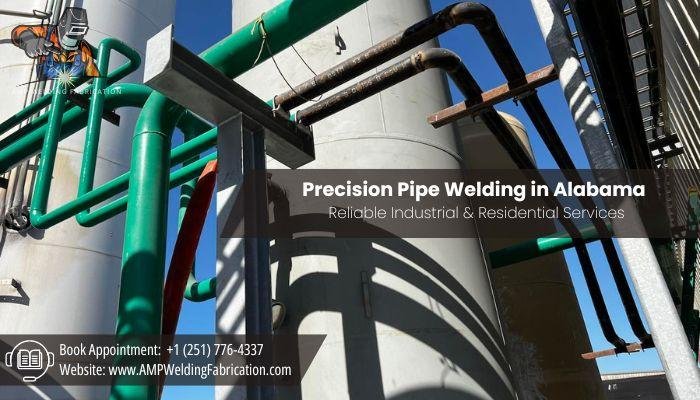Pipe welding is a highly specialized skill that plays a critical role in maintaining and developing Alabama’s growing infrastructure.
Whether it’s in the oil and gas industry, water supply systems, or construction projects, pipe welding provides the backbone for safe, efficient transportation of liquids and gases.
In this article, we will explore why pipe welding AL, the common methods used, and the skills required for those pursuing this trade.
The Importance of Pipe Welding AL
Alabama’s industrial sector is continually expanding, and with it comes the need for highly skilled pipe welders. The state is home to significant industries such as energy production, petrochemical plants, and manufacturing, all of which depend on seamless piping systems. Welders in Alabama are tasked with ensuring that pipes, often transporting volatile substances like natural gas or oil, are durable and leak-free.
This requires both precision and knowledge of various welding techniques, as the safety and efficiency of these systems rely heavily on the quality of the welds. Faulty welds could lead to costly repairs, environmental hazards, or, worst of all, catastrophic failures.
Common Pipe Welding Techniques
There are several welding techniques used in pipe welding, each suited for different materials and conditions. In Alabama, the most popular methods include:
1. Shielded Metal Arc Welding (SMAW): Also known as “stick welding,” this technique is frequently used in pipe welding because of its versatility and reliability. It works well in outdoor conditions, making it a great fit for Alabama’s diverse industrial environments.
2. Gas Tungsten Arc Welding (GTAW): Often referred to as TIG welding, GTAW is known for producing high-quality welds. It’s commonly used when welding thin materials or when precision is of the utmost importance.
3. Flux-Cored Arc Welding (FCAW): This method is similar to MIG welding but uses a flux-cored wire that doesn’t require a shielding gas. It’s ideal for high-speed applications and works well in harsher conditions, such as Alabama’s unpredictable weather.
Why Choose Pipe Welding as a Career?
If you’re in Alabama and considering a career in welding, pipe welding offers a stable and rewarding path. The demand for pipe welders is on the rise, and Alabama’s rich industrial base provides plenty of opportunities. Welders can find work in various sectors, from large-scale construction projects to maintaining pipelines for energy companies.
Here are a few reasons why pipe welding is a great career choice:
- Job Security: With industries like energy and construction thriving in Alabama, pipe welders are in high demand.
- High Earning Potential: Skilled pipe welders often earn higher wages compared to other types of welding professionals due to the technical expertise required.
- Career Growth: Pipe welding skills are transferable across industries, providing welders with numerous avenues for advancement.
Skills Needed for Pipe Welding
Pipe welding is not just about holding a torch and joining two pieces of metal. It requires a deep understanding of different materials, welding techniques, and safety protocols.
- Attention to Detail: A small mistake in pipe welding can have significant consequences. Welders need to be precise and methodical in their work.
- Technical Knowledge: Understanding the properties of metals and how different welding techniques affect those materials is essential.
- Problem-Solving Abilities: Welders often face challenges like difficult-to-reach weld locations or varying environmental conditions. The ability to adapt and solve problems on the fly is crucial.
- Physical Stamina: Pipe welding can be physically demanding, requiring long hours in sometimes uncomfortable positions. Welders need to maintain focus and precision throughout the job.
Alabama’s Certification Requirements for Pipe Welding
In Alabama, as in many other states, becoming a certified pipe welder requires completing a recognized training program and passing certification exams. Various technical schools and community colleges across the state offer welding programs that cover the basics of welding techniques, safety protocols, and industry standards. These programs typically culminate in certification from recognized authorities, such as the American Welding Society (AWS).
Certification is not just a formality; it’s a necessity in many industries, especially those that deal with high-risk materials like natural gas or chemicals.
Having the appropriate certification demonstrates a welder’s proficiency and opens up more job opportunities.
The Future of Pipe Welding AL
Government initiatives aimed at upgrading water supply systems, oil pipelines, and renewable energy projects will create even more opportunities in this field.
Moreover, technological advancements in welding equipment are making it easier and safer for welders to perform their jobs. Innovations like automated welding machines and advanced welding materials are helping to improve the quality and efficiency of welds, further securing pipe welding’s place in Alabama’s future.
Conclusion
Pipe Welding AL is an essential trade that supports many of the state’s most important industries. Whether you’re an aspiring welder or someone interested in learning more about how vital this skill is to the local economy, understanding the basics of pipe welding can provide valuable insights. With the proper training, certifications, and dedication, pipe welding offers a stable, high-paying career with room for growth.
In the end, pipe welding is not just about fusing metals together—it’s about building the infrastructure that keeps Alabama moving forward.







More Stories
Choosing the Right Mortgage Broker in Perth
Are you Looking for Computer Rental Near Me in Delhi ?
“Top Reasons to Use a UK Phone Number List”